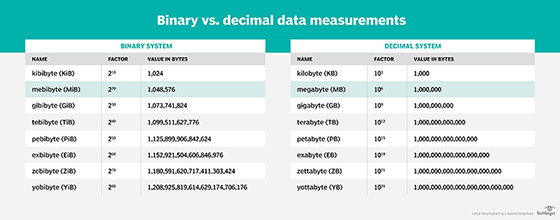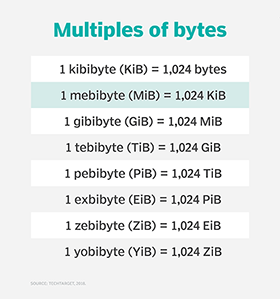mebibyte (MiB)
What is a mebibyte (MiB)?
A mebibyte (MiB) is a unit of measurement used in computer data storage. The prefix mebi comes from the binary system of data measurement that is based on powers of two. A mebibyte equals 220 or 1,048,576 bytes.
The mebi prefix and its companion binary prefixes -- kibi, gibi, tebi, pebi, exbi, zebi, yobi -- were created in December 1998 by the International Electrotechnical Commission (IEC). Until that point, the International System of Units (SI) metric prefixes were being used to refer to both the power-of-10 decimal system multipliers and the power-of-two binary system multipliers.
The SI prefixes include kilo, mega, giga, tera, peta, exa, zetta and yotta. Depending on the context, a megabyte (MB) could refer to either 106 bytes (1,000,000 bytes) or 220 (1,048,576) bytes.
Who uses the decimal system and who uses the binary system depends on the discipline or industry. The communications, electronics and physics sectors have used the powers-of-10 multipliers. The information technology and data storage sectors have used the powers-of-two multipliers often, although not exclusively.
A problem of scale and confusion
Early on in computing, using the same metric prefixes for both the power-of-10 multipliers and the power-of-two multipliers wasn't a huge problem. This was because at the low end of the multiplier scale, the numbers were relatively close in absolute value. For example, the power-of-10 definition for a kilobyte is 1,000 and the power-of-two definition is 1,024. However, as the scale of computing has grown, those differences became magnified and using the two systems of measurement interchangeably became a problem.
As computing technology matured, having the same term refer to two different units of measurement became increasingly confusing. Disk drive manufacturers tended to use the decimal, power-of-10 system when they labeled the capacity of their HDDs and SSDs. On the other hand, OSes often measured computer and storage capacity using the binary, power-of-two system. An HDD labeled 100 MB would be reported by a computer's OS as only having 95.37 MB of capacity.
These sorts of discrepancies led the IEC to create the set of prefixes that were intended to be used only when referring to binary measurements. Using the binary system in the example above, the OS would have reported 95.37 MiB.
The binary prefix system was created to solve the capacity measurement problem. However, in practice, mebibyte and the other binary units of measurement are used in academic circles, technical literature and Open system communities, but not much in commercial environments and discussions. As a result, the confusion around these terms continues.

How large is a mebibyte?
There are eight bits in a byte, 1,000,000 bytes in a megabyte and 1,048,576 bytes in a mebibyte.
Data capacity measurements that are larger than a mebibyte include:
- A gibibyte, which is equal to 1,024 MiB.
- A tebibyte, which is equal to 1,048,576 MiB.
- A pebibyte, which is equal to 1,073,741,824 MiB.
Measurements that are smaller than a mebibyte are:
- A kibibyte -- 1,024 KiB equal a MiB.
- A byte -- 1,048,576 bytes equal a MiB.

Visualizing a mebibyte of data
A single-layer DVD holds approximately 4,482 MiB of data. A typical laptop computer contains about 15,259 MiB of RAM. Twenty-five downloaded songs take up about 95 MiB of space.
Other examples of what 1 MiB looks like include:
- 209,715 five-character words.
- Two novels.
- A quarter of a 10-megapixel photo.
- 14 average emails with no attachments.
Mebibyte vs. megabyte
The terms mebibyte and megabyte are closely related and often used as synonyms, though technically they don't refer to the same amount of capacity. They are close in size, however. One mebibyte equals 1.048576 megabytes. The relatively small difference between the two is, in part, why they are often used synonymously.
At the kibibyte vs. kilobyte and mebibyte vs. megabyte levels, the difference between the binary prefix units of measure and decimal units of measure that use metric prefixes is nearly negligible. But that's not the case at higher levels of measure, such as gibibytes vs. gigabytes and tebibytes vs. terabytes. At these higher levels of measure, the differences between the two systems of measurement become magnified and can cause significant problems if not used accurately.
Editor's note: This article was revised in 2023 by TechTarget editors to improve the reader experience.








